Ministry of Culture
Commemorating 50 Years of Emergency: Ministry of Culture and Delhi Government Observes ‘Samvidhan Hatya Diwas’ to Reaffirm India’s Commitment to Democracy
Nationwide Programmes held affirming commitment to Constitutional Values and Power of Democracy
प्रविष्टि तिथि:
27 JUN 2025 11:57AM by PIB Delhi
To mark the 50th anniversary of the imposition of Emergency, a period remembered as one of the darkest chapters in India’s democratic history, the Ministry of Culture in collaboration with the Delhi Government organized an event - ‘Samvidhan Hatya Diwas’ in the national capital. The occasion served as a powerful reminder of the importance of safeguarding the values enshrined in the Constitution and reaffirming the nation's commitment to democracy.
The event was attended by Union Home Minister and Minister of Cooperation Shri Amit Shah as the Chief Guest, Union Minister of Culture and Tourism Shri Gajendra Singh Shekhawat, Union Minister for Electronics and Information Technology, Railways, and I&B Shri Ashwini Vaishnaw, Hon’ble Lieutenant Governor of Delhi Shri Vinai Kumar Saxena, and Hon’ble Chief Minister of Delhi Smt. Rekha Gupta, among other dignitaries.
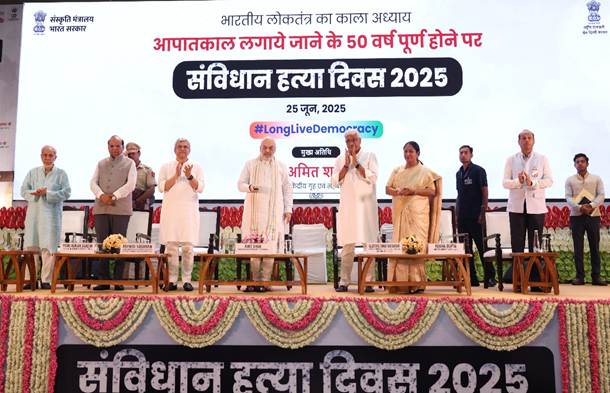
Remembering the Dark Days of Emergency
In his address, Shri Amit Shah spoke about the significance of remembering the dark days of Emergency, not just as a historical episode, but as a lasting lesson in the protection of democratic ideals.
“Bad events are generally meant to be forgotten. However, when such events pertain to social and national life, they must always be remembered. This is essential so that the youth of the country are instilled with the right values, stay prepared to defend democracy, and ensure that such dark incidents are never repeated.”
He noted that it was with this thought that Prime Minister Shri Narendra Modi decided to observe June 25 every year as ‘Samvidhan Hatya Diwas’, a decision formalized through a notification by the Ministry of Home Affairs. The day serves to educate younger generations about the perils of authoritarianism and the need to uphold the spirit of the Constitution.
“It is crucial to remember this day so that no one in the future can impose autocracy in this country. During the Emergency, a dangerous ideology took root — that the party is bigger than the nation, the family is bigger than the party, the individual is bigger than the family, and power is above national interest.”
He said that the current national sentiment reflects the idea of ‘Nation First’ under the leadership of PM Modi:
“Under the leadership of Prime Minister Modi, the idea of 'Nation First' now resonates in the hearts of the people. This transformation has been made possible because of the struggle of thousands of warriors of democracy who spent 19 months in prison. Today, under the leadership of Shri Modi, 140 crore Indians are striving to make India number one in every field globally by 2047 — and moving forward with resolve toward that goal.”
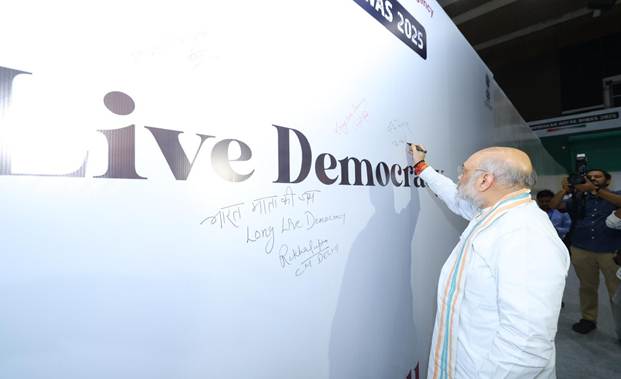
Shri Gajendra Singh Shekhawat, Union Minister of Culture and Tourism, reflected on Bharat’s long democratic tradition and the grave impact of the Emergency:
“Democracy has existed in Bharat for many centuries. At a time when the world could not even imagine the concept of democracy, Bharat had already established democratic systems in various forms. From those ancient times to the long struggle for independence, millions dedicated their lives to free Maa Bharati. Thousands accepted death on the gallows, and countless others endured the tortures of dark prison cells — like Veer Savarkar.”
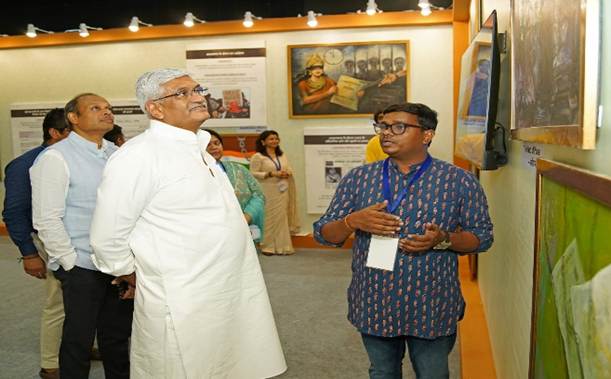
“However, unfortunately, 50 years ago, circumstances arose when an autocratic regime, driven by hunger for power, imposed Emergency in the country. The freedom of expression that we had earned through immense sacrifice was snatched away in the name of Emergency. The kind of tyranny witnessed during those 21 months still sends shivers down the spine of those who lived through it.”
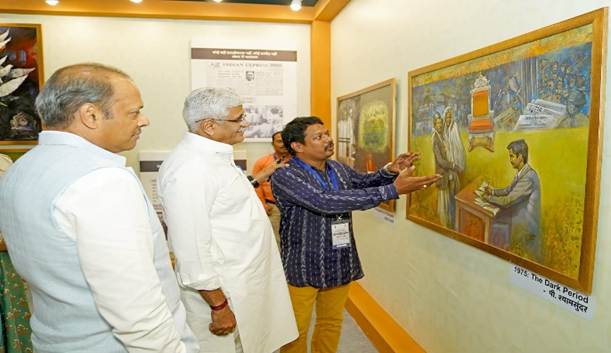
Smt. Rekha Gupta, Chief Minister of Delhi, called for introspection and historical awareness among the citizens:
“I believe when a grave wrongdoing occurs in history, especially one caused by those driven by their greed for power, and that results in the complete subversion of the Constitution and the murder of democracy — it becomes necessary to remember that moment.”
“We must remember it so that those who walk around with the Constitution in their pockets and preach about saving democracy are reminded that if ever there was a true betrayal of democracy, it happened on June 25, 1975 — the day the entire nation was turned into a prison. Today, as we recall that day, we must take a pledge that in the future, Bharat’s Constitution shall never again be threatened, and democracy shall never again be plunged into darkness.”
Shri Vinai Kumar Saxena, Hon’ble Lieutenant Governor of Delhi, emphasized the importance of internalizing the values of the Constitution rather than merely displaying them:
“After nearly a thousand years of foreign invasions, our Constitution makers crafted a Constitution under the leadership of Babasaheb Ambedkar and Dr. Rajendra Prasad which reflected the soul of Bharat and its ancient culture. But on June 25, 1975, with the imposition of Emergency, not only was our democracy and freedom brutally crushed, but the very Constitution was also murdered.”
“Today, it has become a fashion to hold a copy of the Constitution and speak of constitutionalism. But I earnestly urge everyone to truly understand the soul of Bharat that lies within the Constitution. If we truly understand the spirit and cultural essence embedded in it, there will be no need to wave copies of the Constitution.”
Shri Ashwini Vaishnaw, Union Minister for I&B, spoke about the impact of Emergency on the press and civil liberties:
“Maa Bharti is the Mother of Democracy. Our nation is the world's largest democracy. Yet, exactly 50 years ago, our democracy was attacked — the Emergency was imposed on the country. That period remains one of the darkest chapters in the history of our Republic.”
“The media, often called the fourth pillar of democracy, was silenced across the nation. The Press Council of India was dissolved so that there would be no criticism of the government. The atmosphere during the Emergency was deeply suffocating. Yet, in those trying times, some media houses and journalists stood their ground with courage and strongly opposed the dictatorial mindset.”
Special Exhibition: The Three Stages of Indian Democracy
A key highlight of the event was a curated exhibition which offered a thought-provoking journey through the evolution, challenges, and strengthening of democratic values in Bharat. The exhibition was divided into three thematic sections:
- Bharat: Mother of Democracy – This segment showcased India’s ancient and enduring legacy of participatory governance, underscoring the deep cultural roots of collective decision-making and civic engagement that existed long before modern democratic systems evolved.
- Dark Days of Democracy – A stark visual documentation of the Emergency era, this section highlighted the breakdown of constitutional norms, the suppression of civil liberties, press censorship, and political repression that gripped the nation between 1975–77.
- Strengthening Democracy in India – The final section celebrated the progressive strides India has made in deepening democratic values, highlighting transformative reforms such as the Nari Shakti Vandan Adhiniyam, Direct Benefit Transfers, digital grievance redressal systems, and electoral transparency measures. These initiatives reflect the government’s commitment to making democracy more inclusive, responsive, and citizen-centric.
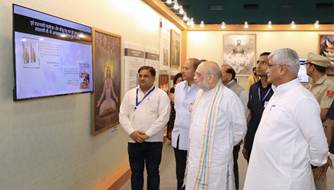
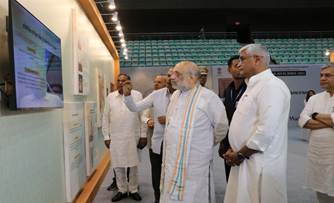
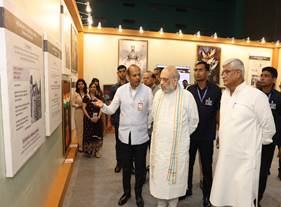
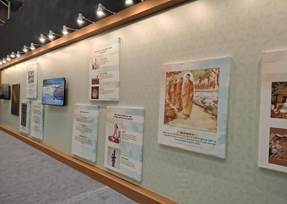
Cultural Commemoration Through Theatre and Film
The event also featured a short film and theatrical presentation that brought to life the emotional trauma of the Emergency. A special play titled ‘Samvidhan ki Hatya” by the National School of Drama offered a powerful stage depiction of the period, dramatizing the personal struggles, institutional collapse, and the undying spirit of resistance during the 21-month Emergency. The performance served as a vivid reminder of the price paid by thousands to defend democratic values.
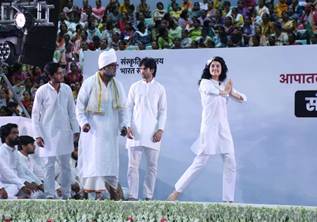
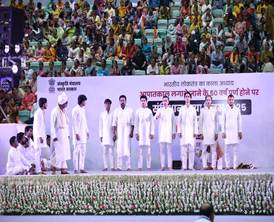
In addition, a short film was screened — a compelling cinematic retelling of the Emergency era, capturing the timeline of events, suppression of civil liberties, and the courage of those who stood up against authoritarianism.
Watch the movie here:
https://youtu.be/u86bIEM2-1I?si=h5Awh5TqrbzETyao
Book Launch: “The Emergency Diaries – Years that Forged a Leader”
A highlight of the evening was the release of the book “The Emergency Diaries – Years that Forged a Leader”, which documents Prime Minister Shri Narendra Modi’s underground role during the Emergency and the larger people’s movement against authoritarian rule.
Speaking at the launch, Shri Amit Shah recounted the book’s powerful insights:
“This book mentions Shri Narendra Modi's work as a young Sangh Pracharak during the Emergency, how he fought by remaining underground during the 19-month-long movement led by Jayaprakash Narayan and Nanaji Deshmukh. The book details how he went to the homes of people jailed under the MISA Act and talked to their families and arranged for their treatment.”
“The book describes how Modi ji distributed newspapers published secretly in markets, squares, among students and women, and that he led the struggle as a 25-year old youth of Gujarat. Shri Shah said that Modi used to work underground at that time, sometimes as a saint, sometimes as a Sardarji, sometimes as a hippie, sometimes as an incense stick seller or sometimes as a newspaper seller.”
“It was a 25-year-old youth who opposed the dictatorial ideas of the then Prime Minister. The Emergency was imposed to re-instate dynastic politics, but Modi ji went door-to-door, village-to-village and city-to-city to protest against it, and finally he uprooted the dynastic politics from the entire country in 2014.”
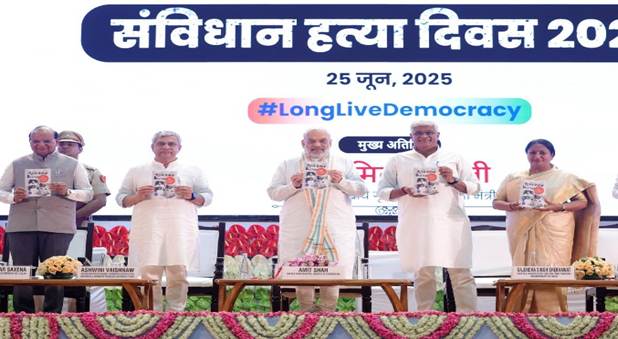
“He said that there are five chapters in this book on media censorship, government repression, the struggle of the Sangh and Jansangh, description of the victims of the Emergency and from dictatorship to public participation.”
Loktantra Zindabad Yatra: A Torch of Democratic Resolve
As a symbolic tribute to democratic values, ‘Loktantra Zindabad Yatra’, organized by the young volunteers of MyBharat was also flagged off by Shri Amit Shah, who handed over the mashal (torch) to the youth representatives.
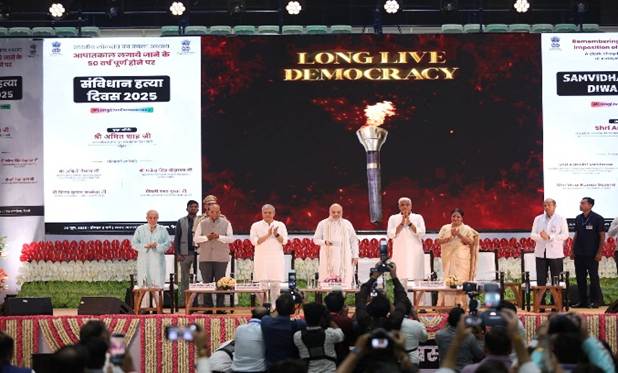
The torch will traverse the length and breadth of the nation — from villages to cities — as a living symbol of India’s democratic spirit and the collective resolve to prevent the return of authoritarianism.
***
Sunil Kimar Tiwari
pibculture[at]gmail[dot]com
(रिलीज़ आईडी: 2140084)
आगंतुक पटल : 1075